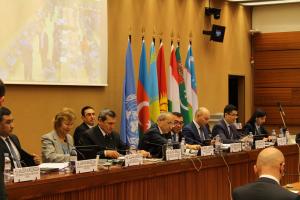Gathering in Geneva on the margins of this week’s UNECE 70th Commission session, Ministers and high-level representatives of countries participating in the United Nations Special Programme for the Economies of Central Asia (SPECA) – Azerbaijan, Kazakhstan, Kyrgyzstan, Tajikistan, Turkmenistan and Uzbekistan – adopted a joint statement to emphasize the unique role that SPECA can play to harness resources for sustainable and resilient development in Central Asia.
The ministers and heads of delegations of SPECA participating States convened for a high-level dialogue with heads of UN regional commissions, Permanent Missions of UN Member States, international organizations, specialized agencies, and civil society to mark the 25th anniversary of the establishment of SPECA and to advance their common interests in diversification of transit routes, trade and transport facilitation, as well as digitalization and green transformation in Central Asia and beyond.
“After 25 years of existence, SPECA has become a unique mechanism of coordinating, cooperating, and learning from each other, based on UN norms, standards and legal instruments, and with UN regional commissions as partners,” noted UNECE Executive Secretary Olga Algayerova. “In the context of multiple global and regional crises, SPECA can and should be an impactful platform for regional cooperation, facilitating in particular connectivity and border crossing through the applications of our flagship Conventions. UNECE stands ready to continue to support SPECA, in close partnership with UNESCAP”.
This year, under the chairmanship of Azerbaijan, SPECA will focus on enhancing digitalization and connectivity under the theme “Transforming the SPECA region into a connectivity hub with global outreach.” This theme coincides with the overall focus of UNECE’s 70th Commission session, which will be on digital and green transformations for sustainable development.
Based on a growing shared interest of the SPECA participating States to strengthen digital connectivity along transit routes between Asia and Europe, the joint statement requests UNECE to develop a roadmap for digitalization of multimodal data and to document exchange along the trans-Caspian transport corridor using relevant UN standards and legal instruments, including through implementation of a regional pilot project for SPECA participating States.
The joint statement also endorses the proposal to initiate a UN General Assembly resolution to highlight the 25th anniversary of SPECA and encourage the UN Member States, UN regional commissions and specialized agencies to continue extending support to efforts of the SPECA participating States.
Note to editors
The United Nations Special Programme for the Economies of Central Asia (SPECA) was launched in 1998 to strengthen subregional cooperation in Central Asia and facilitate its integration into the world economy. The SPECA participating countries are Afghanistan, Azerbaijan, Kazakhstan, Kyrgyzstan, Tajikistan, Turkmenistan, and Uzbekistan. UNECE and the United Nations Economic and Social Commission for Asia and the Pacific (UNESCAP) jointly provide overall support and coordination to the programme on the principle of annual rotation. Find out more here.


